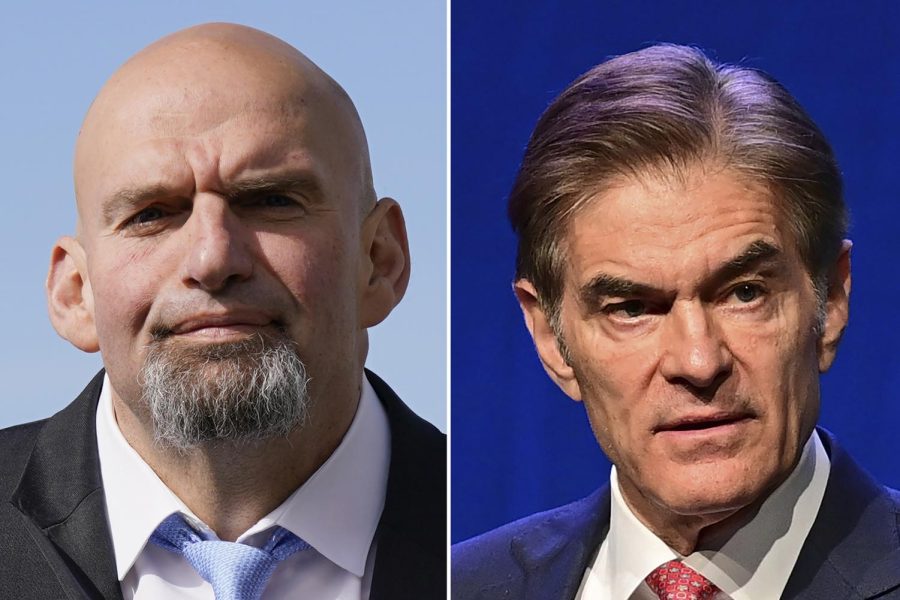Fetterman and Oz debate in PA Senate race
This combination of file photos shows Democratic Senate candidate, Pennsylvania Lt. Gov. John Fetterman, left, and Republican Senate candidate Dr. Mehmet Oz.
Nov 4, 2022
On Tuesday, Oct. 25, Democrat Lt. Gov. John Fetterman and Republican Dr. Mehmet Oz participated in the only debate for the US Senate race in Pennsylvania.
The two sparred against various topics ranging from abortion to fracking. Oz made it clear that he feels abortion should be a state’s rights issue while avoiding directly stating whether he would support Sen. Lindsey Graham’s abortion bill. Fetterman pushed his belief in codifying Roe v. Wade and making it the law of the land. Both Oz and Fetterman have said in past interviews that they do not support fracking, but neither of them was able to explain their shift in support on the topic. Fetterman struggled through his response, due to his stroke, by stating, “I do support fracking, and I don’t, I don’t — I support fracking, and I stand, and I do support fracking.”
This debate was significant for both candidates due to the stroke Fetterman had this past May. Oz was eager to display the mental deficiencies and lack of speaking capabilities of Fetterman while the Fetterman campaign wanted to show that the stroke was no longer an issue. The two campaigns agreed to have a close captioning system for the Lieutenant Governor so he could to fully process the questions and responses. After the debate, Fetterman claimed “The debate wasn’t easy, you know…After that stroke, I got knocked down, but I got back up because I had to. And that’s really the core value of our campaign.” Fetterman continued by saying “We are running for anyone that ever got knocked down that had to get back up, too. Any forgotten communities or community’s towns that got left behind, that got knocked down, because they have to get back up.”
Colin Swearingen, professor of Political Science at John Carroll University, argues that “Debates aren’t necessary for an election to take place.” Instead, they are for the benefit of the losing candidate.
“From a strategic perspective, if you are winning, you have more to lose during a debate than your opponent,” Swearingen argues, “The act of debating provides them with an opportunity to try to level the race.”
The two sides have each attempted to call the debate a win for themselves. However, many Democrats feel the debate was ill-advised for the Fetterman campaign and fear that it may have damaged his campaign with only two weeks until Election Day.
“He should not have debated. Anyone on his team who agreed to a debate should be fired, or never work again, because that debate may have tanked his campaign,” said Chris Kofinis, a veteran Democratic campaign strategist. Sen. Majority Leader Chuck Schumer expressed his worried opinion about Fetterman’s performance. He was seen talking to President Biden about the debate saying, “It looks like the debate didn’t hurt us too much in Pennsylvania.” However, Swearingen claims “I’m not aware of any one debate that completely sunk a candidate in the context of the US Senate campaign.”
Some Democrats have claimed Fetterman should have done more live events to warm the public to his speaking issues. Swearingen feels “…skeptical that more events would have better-acclimated voters to his present recovery status.” Instead of the debate performance of Fetterman, Swearingen finds his lack of transparency to be the main issue. He stated, “had [Fetterman] been more transparent about the severity of his stroke and how long it takes to recover, the debate may have been less alarming to those voters.”
With the general election approaching, this specific Senate election will be vital to the scales of power in Washington.













